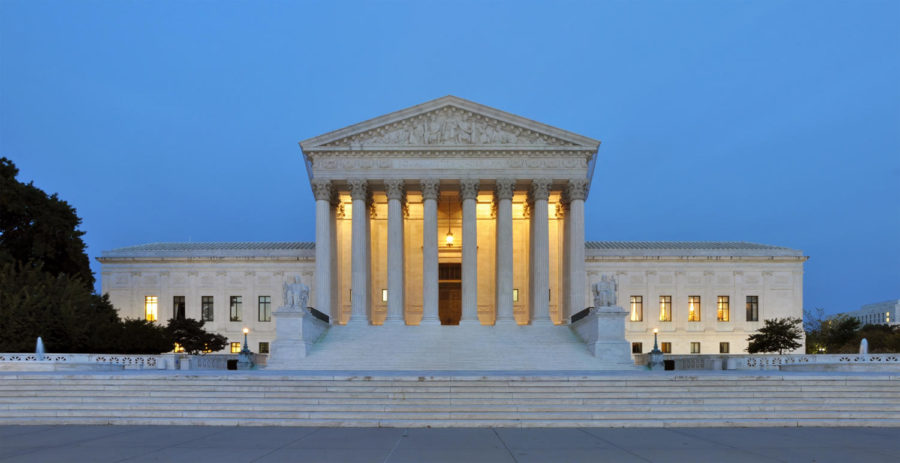Supreme Court allows transgender military ban to take effect
Panorama of the west facade of the Unites States Supreme Court Building at dusk in Washington, D.C.
January 22, 2019
The United States Supreme Court removed injunctions on the Trump administration’s ban on transgender individuals serving in the military Tuesday morning.
The ban was announced over Twitter in July 2017 by President Donald Trump. In his tweet, Trump said that transgender individuals would not be able to serve in the U.S. military in any capacity due to the “overwhelming medical costs and disruption.”
Opponents to the ban have labeled it as hateful and unnecessary, while supporters have claimed the ban to be for the good of the United States as a whole.
“The trans community is systematically and relentlessly targeted in our society,” nicci port, project director for diversity and inclusion and LGBTQ+ initiatives, said. “My hope is that court decisions will continue to trend toward progress in cases that will be litigated given the lifting of these injunctions. However, my concern is that no matter which way those decisions trend, society at large will still see it as their right to continue their march against the transgender community.”
One Iowa, a statewide LGBTQ organization working to preserve and advance the rights of Iowans, has condemned the ban as “a slap in the face of the brave transgender service members and veterans who have served and are serving our country.”
Jacob Minock, president of the College Republicans, said he believes the transgender ban is no different from the variety of other reasons the U.S. military restricts admittance to their ranks.
“The military has banned individuals from joining for a plethora of reasons including eyesight, jaw disease, diabetes, foot structure, pregnancy or height,” Minock said. “As the Supreme Court hasn’t turned over any of those bans, I don’t think this ban will be overturned. Serving in the military is a privilege and not a right.”
College Democrats President Taylor Blair said he believes the medical aspect of a transgender person’s service is overstated.
“When he first tweeted about it, he talked about the medical aspect and the cost of treatment, all this stuff that I think is far less important as the base fact that there are people in our country who want to serve in our military, to protect their rights, to protect their country,” Blair said. “To deny these people their sacrifice; they are making a sacrifice for our country, and it’s so disrespectful to treat them this way.”
The ban has been in a state of injunction since 2017, due to smaller courts deeming it unconstitutional.
On Tuesday, the Supreme Court split 5-4 — a vote that allowed the ban to take effect, though it was not an official approval of the act. Justices Ruth Bader Ginsburg, Stephen G. Breyer, Sonia Sotomayor and Elena Kagan dissented, while Justices Neil Gorsuch, Brett Kavanaugh, Samuel Alito, Clarence Thomas and John Roberts voted in favor.
“While this case does raise important constitutional issues, now is not the appropriate time for this court to consider them,” according to the official Supreme Court opposition brief. “No court of appeals has issued any decision addressing those issues. No case raising those issues has yet been litigated to final judgment in a district court.”
Minock said he believes this is another action in a pattern of Trump’s “streamlining of the U.S. Military and the safety of our nation.”
Blair had a different perspective on the necessity of the transgender ban, especially in the presence of many other issues.
“There are a lot of problems that need real solutions in our country, and time and time again we see [the administration] going after marginalized communities,” Blair said. “I would like to see the administration actually work on solving issues in a constructive way. Let’s work on actual problems. There are issues with trans people in our country, and it’s definitely not in the military. It’s access to healthcare and acceptance.”
Kelly Shaw, a senior lecturer of political science, said he was uncertain about the consequences this ban may have on future political discussions.
“Obviously, the president as commander and chief feels that transgender soldiers are somehow a liability to the operations of the military,” Shaw said. “This policy might very well be a test case and lay the groundwork for other anti-trans policies. However, it could also just be something Trump and his military leaders feel needed to happen in this case. It is hard telling where this might all lead but could very well set a precedent that leads to other like policies — or not.”
















